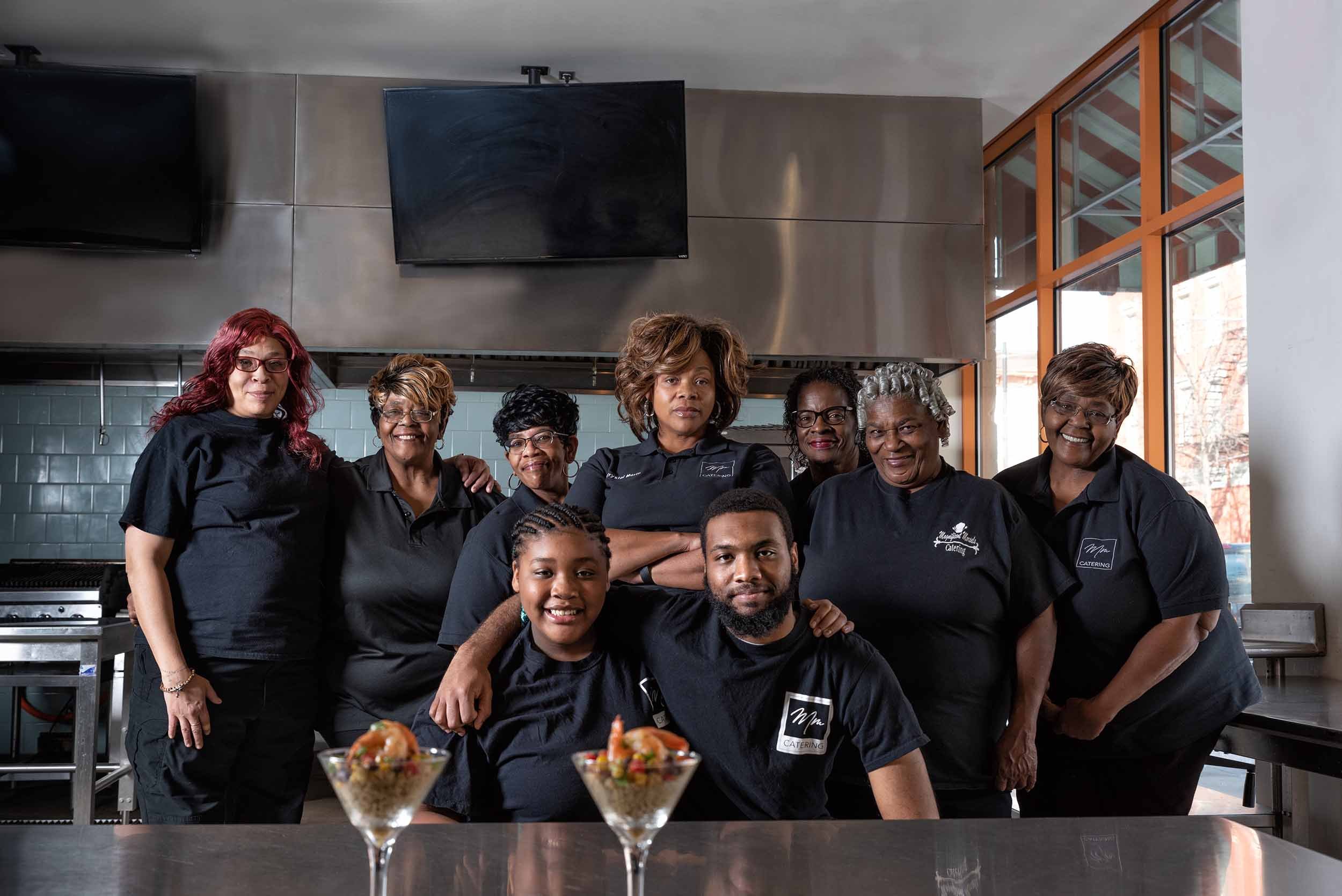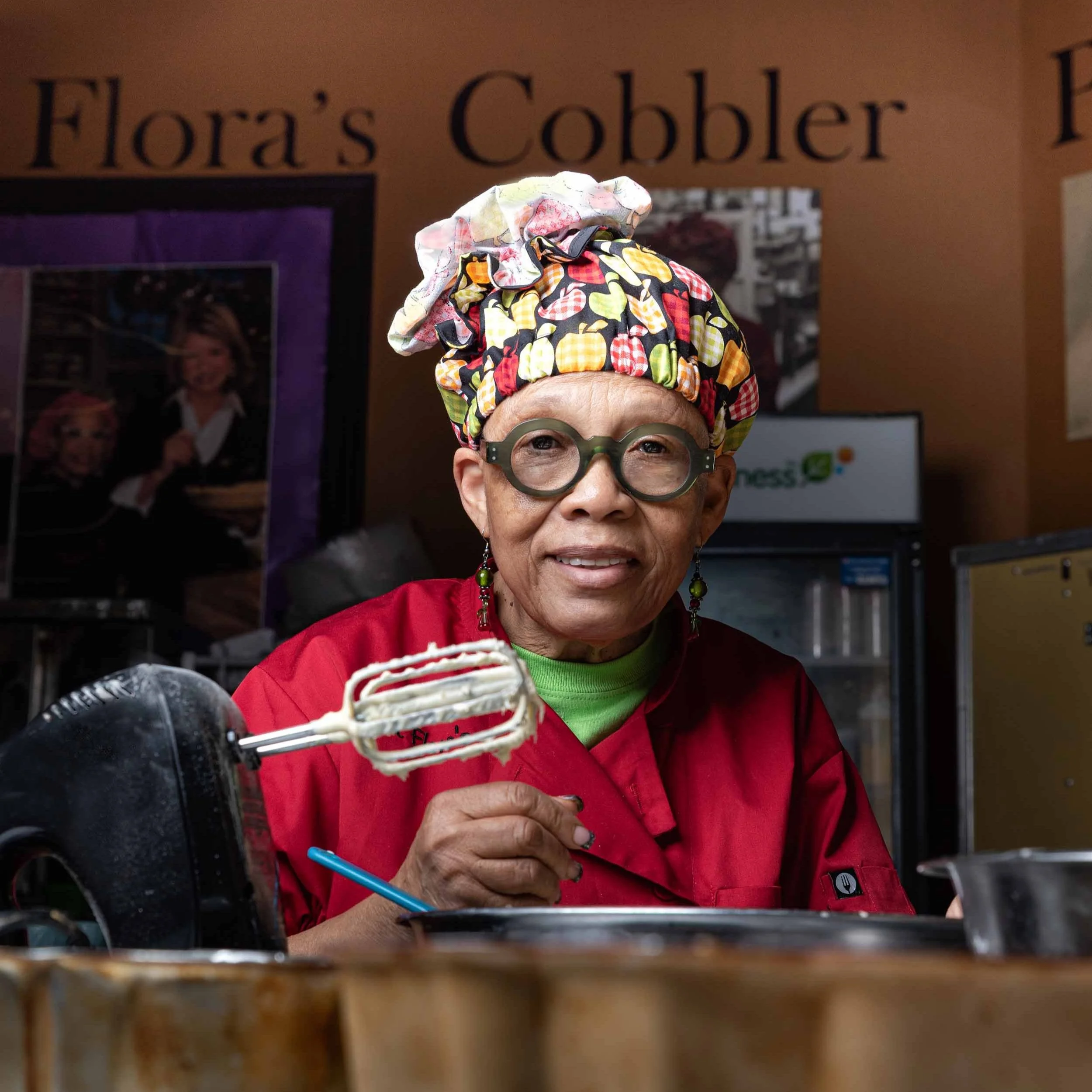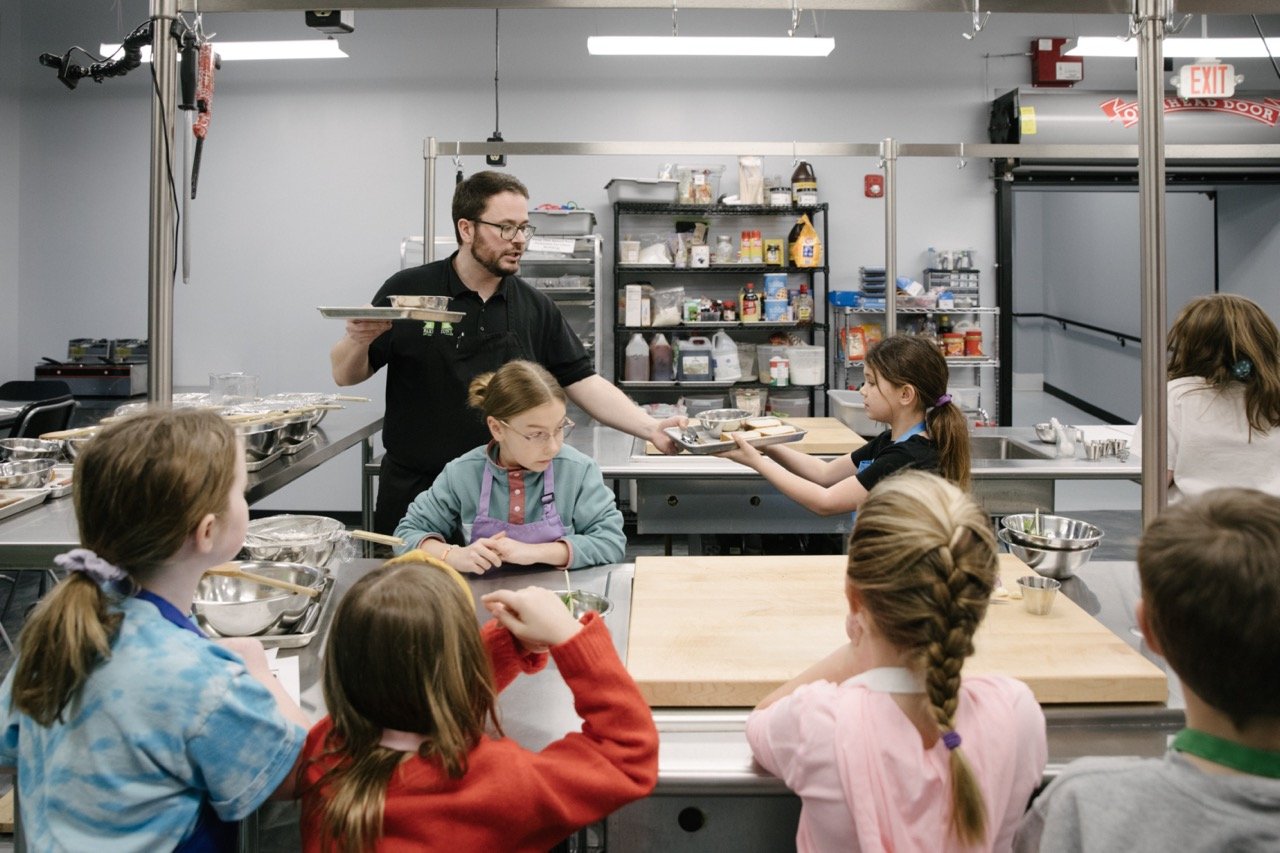The Power of Grants

Photography by ANJALI FONG
Four local Black-owned food businesses were awarded grants that have not only allowed them to survive, but to thrive.
Last May, Crystal Render, owner of Magnificent Morsels Catering (MMC), was in a panic. As owner of a catering company known for serving “artistically displayed Southern chic cuisine,” she had signed a federal contract with the nonprofit Whole Again to provide more than 40,000 meals in just 10 weeks to food-insecure kids in Cincinnati over the summer.
She wasn’t worried about the volume. The pandemic had expanded her business model from primarily boutique to commercial catering. Rather, it was an overlooked line in the contract that was causing her to lose sleep: She didn’t realize she’d have to shoulder the cost of the project up front.
Render kept running the numbers, trying to think of a solution. She thought she was going to have to back out. But then, she got a call. A woman told her she had won a grant. Render thought it was a scam. The woman told her the amount. Render was convinced it was scam.
The next morning, Render received an official email confirming that she had been awarded a Black Kitchen Initiative grant from The LEE Initiative, in partnership with Heinz and Southern Restaurants for Racial Justice.
Render called the woman back. They both laughed. And thanks to that grant, MMC was able to keep the contract with the social service agency to feed local kids. Plus, the experience helped prove MMC’s ability to mass produce meals, leading to more business contracts today.
“Black Kitchen Initiative is one of those beautiful entities that are working in the background to support and uplift fellow minority businesses,” Render says. “There are no words, honestly, for the gratitude I have for them. Unfortunately, even in this day and age the playing field for not only small businesses but especially small minority-based businesses is still very uneven. We just do not have the resources and the help that we should in order to scale our businesses. So initiatives like this that continue to see and support us are imperative to our survival.”
SUPPORTING BLACK-OWNED FOOD BUSINESSES
The LEE Initiative awarded $1,111,000 to 71 Black-owned businesses across the U.S., including four locally: Magnificent Morsels Catering, Aunt Flora’s Cobbler Pie Company, Boomtown Biscuits & Whiskey, and Julia’s Catering.
“LEE stands for Let’s Empower Employment and we’re passionate about creating a more fair, equitable, diverse, and kind restaurant industry,” says Lindsey Ofcacek, LEE Initiative cofounder and managing director.
Founded in 2017 by Ofcacek and Chef Edward Lee in response to the #MeToo movement, The LEE Initiative, based in Louisville, does this by focusing on increasing employment opportunities and working to make the restaurant industry more sustainable.
“The playing field for not only small businesses but especially small minority-based businesses is still very uneven.”
— Crystal Render, Owner, Magnificent Morsels Catering
Southern Restaurants for Racial Justice (SRRJ) was walking a similar path. “SRRJ was started by four bakers in the South to support Black-owned restaurants during a time when they knew that federal funding and government resources would skew toward the companies and businesses that had resources outside of the caste system of deeply embedded racism in America,” says Lisa Donovan, one of the SRRJ’s founders. “SRRJ started with South-wide fundraising with support from white-owned restaurants and then moved out, with the assistance of the LEE Initiative, into the arena of larger-scale fundraising campaigns.”
Today SRRJ is a coalition of bakers, chefs, makers, and restaurant owners. “We love what Southern Restaurants for Racial Justice was doing for Black-owned food businesses and felt like we had a unique opportunity to help, especially with the support from our partners at Heinz,” Ofcacek says.
MAINTAINING A LEGACY
This fall, cameras circled around Aunt Flora and her husband, Ron Mincy, as they pitched their apple pie filling while participating in a reality TV competition.
“Step right up, America!” Aunt Flora said to a panel of judges. “You’ve got to try Aunt Flora’s apple pie filling. And honey, it will be so good, it’ll hit you right at the top of your head to the soles of your feet.”
Guests on season 1, episode 5 of USA Network’s America’s Big Deal, the couple, married for 35 years, pitched a $30 gift box that included a jar of the pie filling and two bags of gourmet flavored coffee (sweet potato and blackberry). Although the product was new, the spotlight was not. Aunt Flora also appeared on The Martha Stewart Show in 2007 and The Oprah Winfrey Show in 2012.
Aunt Flora, 72, is owner of Aunt Flora’s Cobbler Pie Company, another Black Kitchen Initiative grant winner. Known for her cobblers and pound cakes, Aunt Flora works with Mincy out of the Northgate Mall food court. In an adjacent stall they also own and operate a soul food restaurant, Mention’s Fish and Chips.
Some of Aunt Flora’s earliest memories of cooking were in a kitchen with her aunt, Flora Saunders, who was hired to travel around the country in the 1940s portraying Aunt Jemima as a way to promote Quaker Oats products.
A fixture of the Cincinnati food scene, Aunt Flora works with her husband, Ron Mincy, out of the Northgate Mall food court. They also own and operate a soul food restaurant, Mention’s Fish and Chips. Aunt Flora’s cobbler has been featured on TV.
Like Render, Aunt Flora has expanded her business offerings in part because of the pandemic. She aspires to package her own products, like that apple pie filling, and sell them to grocery stores.
The pandemic also brought great financial loss: When Northgate Mall was shut down, so were their businesses. “In 2020, we closed in April and we opened back up in September,” Aunt Flora says.
In addition, since 2003, Mincy has had numerous major surgeries. “Every time something took place, I closed my business down and I stuck with him in the hospital,” Aunt Flora says. “I would sleep there, I would stay there, each time. So we stopped and we started and we stopped and we started. But the blessing is that Aunt Flora has a good reputation.”
Every time they reopened, customers flocked back.
“It’s real personable,” she says. “We connect with every customer. We connect, and we share, and we make sure their food and their desserts are right. My husband knows everybody by name. Even if you’re a new person coming, and they start ordering, he says, ‘Welcome home.’”
Between the overwhelming medical bills and shutdowns, the timing of the Black Kitchen Initiative grant couldn’t have been better. “I was able to get back on my feet with that money,” she says.
Aunt Flora says grants are particularly important to Black business owners. “A lot of Black businesses, you can’t go to the bank and get a loan, you can’t get money from here or there,” she says. “With the grant situation though, I think that helped a whole lot of African Americans build their dream of owning their own business or, for a business that they had started, enhancing it or making it last. That’s what it did for us, it helped make us last. Because we have a history, we have a legacy.”
FUELING BUSINESS EXPANSION
When Julia Pitts, owner of Julia’s Catering (doing business as Julia’s Home Cooking) received the call from LEE Initiative, she says she screamed.
“After I calmed down, I thanked her and told her, ‘You don’t know how much this money is going to help during these challenging times with Covid,’” Pitts says. “This grant allowed me to expand my curbside and delivery service, and I was able to hire two part-time employees.”
After a long career in management, Pitts opened Julia’s Catering in 1997. Top-selling items include her sweet potato casserole, macaroni and cheese, fried and baked chicken, and meatloaf.
“I provide home-cooked meals for busy working families as well as seniors who are no longer able to cook but want a good home-cooked meal,” she says. Her catering clients include corporations, community and church groups, family reunions, and weddings.
Pitts subcontracts with Duke Energy Convention Center in Cincinnati, in their food court. When the pandemic hit and all scheduled events were cancelled, Pitts lost substantial business.
“The Black Kitchen Initiative is extremely important for Black-owned small businesses because it is often more difficult for them to obtain funding to keep their business afloat during difficult times,” Pitts says. “I, personally, will be eternally grateful for the grant I received through LEE Initiative. It helped me maintain my business as I continue to move forward doing what I love and have a passion for: cooking and serving and making people happy.”
SUPPORT AS AFFIRMATION
Boomtown Biscuits & Whiskey also received a grant. In a podcast with “soul food scholar” Adrian Miller for the Black Kitchen Initiative, chef and owner Christian Gill describes Boomtown as a “deep, thematic, immersive brand experience.”
Growing up in Lexington, Gill learned how to cook from his mother and grandmother. In 2016, when Gill was executive chef at the Cincinnati Art Museum, restaurateur PJ Neumann approached him with an idea for a place that would allow Gill to spotlight his grandmother’s biscuit recipe. Boomtown opened in the Pendleton neighborhood in 2018. The year 2020 brought devastating difficulty. In January, Neumann died. Then came shutdowns, quarantines, and labor challenges—which continued into 2022 and threatened to derail the original location, which managed to stay open with customer support. (Boomtown also operates in Union, KY.)
In the interview, Gill says receiving the Black Kitchen Initiative grant reaffirmed that he was doing something right. “It means that all the time and energy and blood, sweat, and tears that I put into just trying to persevere through every hardship and every heartache, it just means that I’m doing something right,” he says.
LOOKING AHEAD
SRRJ’s Donovan says the grant program has a singular goal: “Our only hope is for the money to be used to build, stabilize, and overcome in a system that would rather see these companies fail than thrive.”
Already, that is happening.
Render’s path to food entrepreneurship was sparked by her mother, Gloria, and Gloria’s twin sister, Laura. The two followed a long-held dream to open a restaurant, Magnificent Morsels, in Covington, KY. But the business didn’t work out.
Inspired by their passion, Render enrolled in culinary school so she could help them do it properly. Her mom and aunt joined her, and all three graduated in 2009. They rented restaurant space in College Hill, completely remodeled, and immediately faced challenges. Render got pregnant, then became very ill. Feeling the weight of responsibility, she nonetheless opened the restaurant as soon as she could—and they were slammed. Their landlord took note and, wanting to take advantage of the increased business, refused to pay the insurance unless they left. Render had to make the heartbreaking—yet empowering, she says—decision to walk away.
With her culinary degree in hand, as well as business training (thanks to a partnership among Mortar, Findlay Kitchen, and Aviatra Accelerators), Render opened MMC as a catering business. In addition to serving a wide range of clients, from cozy at-home dinner parties to fancy weddings to 1,700 Amazon employees, Render has been working with La Soupe, providing meals to school systems, nursing homes, and shelters.
Render’s not stopping there. “MMC will have its own storefront, community classroom, marketplace, and home kitchen collection,” she says.
Grants like the one from Black Kitchen Initiative help make those long-term goals reality.
“I’ll be honest with you, I’ve been hands-over-fist astronomically blessed over the last few years,” Render says. “This opportunity, it’s very emotional. Because I’ve worked very hard for a very long time, with my head down. And I didn’t need notoriety. I just did what was right. It’s moments like this that let me know those things weren’t overlooked or unnoticed.”
Kara is a freelance writer and editor, a managing editor at Lost Art Press, and a contributing editor at Writer’s Digest magazine. She lives with her family in Fort Thomas, KY. You can read more of her work at PleiadesBee.com.






